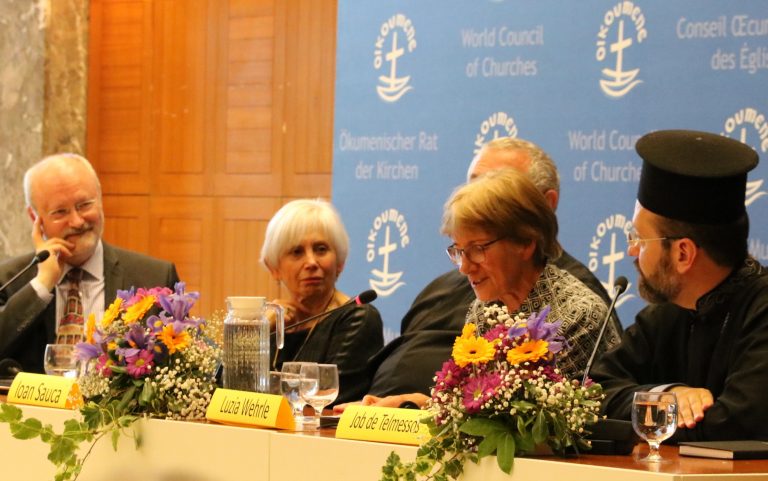
Basta amare! This is the core of Chiara Lubich’s message for unity. A message full of hope and respect for the work of the World Council of Churches (WCC) towards justice and peace.
On 18 April, more than 160 people attended the WCC – Focolare joint event opened by Rev. Dr Olav Fykse Tveit, WCC general secretary, and Father Jesús Morán, co-president of the Focolare Movement.
Tveit recognized the importance of cooperation and mutual support between the WCC and the Focolare to serve together for justice and peace. “We are walking forward together in a broken, polarized world, but we are also moving into a deeper commitment for our work on unity. The unity of peoples and nations, but in many respects also the unity of the church, must be developed as part of multicultural and multi-religious societies”.
Tveit concluded: “So we will be strangers no longer, but pilgrims together on the way, witnesses of the coming of God’s reign of justice and peace”.
Morán said that dialog is at the foundation of a true spirituality of unity. “In dialogue each person is completed by the gift of the other. We need one another to become ourselves. In dialogue, I give myself, my diversity to the other. True dialog is existential because we risk ourselves, our vision, our identity – cultural and ecclesial – but it will not be lost, it will be enriched in its openness”.
He concluded: “People in dialog write the history.”
Teny Pirri-Simonian, former staff of the WCC in Church and Ecumenical Relations as well as co-Secretary of the Joint Working Group between the WCC and the Roman Catholic Church, shared her personal experience with Chiara Lubich and the Focolare Movement: “Chiara shared my personal commitment to ‘hard love’ as the road to unity. Compassion has no meaning unless it is accompanied by introspection, dialogue and respect of the other.”
Father Ioan Sauca, WCC deputy general secretary and director of the Bossey Ecumenical Institute, shared his thoughts on Lubich’s talk on the spirituality of unity at the occasion of her visit at Bossey in 2002.
Sauca said: “She was 100% Roman Catholic, but a Roman Catholic that opened to the others. She did not give up her Catholic identity, but she encountered people on the basis of dialogue and communion. Her ecumenism was a clear identity opened to discuss with other clear identities”.
Rev. Dr Callan Slipper, Anglican priest and member of the Focolare Movement, recalled that Focolare is not a movement present in one church only. “We live an ecumenism of the people, a living ecumenism, a dialog of life”.
He also remembered Lubich: “Her spiritual discipline does not only exhort to us to dwell in unity; it tells us how to live it. It shows us how to enter into the mystical depth of John’s gospel (17, 21): “that they may all be one”.
Luzia-Tersa Wehrle, former WCC staff and member of the Focolare Movement, shared a discussion she had with Lubich on her mission as a Focolarina working at the WCC. “I was full of enthusiasm to be able to contribute to the mission of WCC and I thought that by living out this spirituality of unity, by sharing it, soon the dream to be one would be realized in the ecumenical movement”.
Lubich answered her: “Basta amare – all you need is “to love”, to love Jesus in each person…”
The afternoon ended in the Ecumenical Chapel with prayers and songs prepared by 80 youth from the Formation Centre in Montet, Switzerland. At the heart of the worship, participants prayed with Lubich’s words: “Kindle in us all a great fraternal respect, help us to listen profoundly to one another, arouse among us that mutual love which allows, indeed, which ensures your spiritual presence in our midst. Because we know, Lord, that ‘without you we can do nothing’ (John, 15:5).”
Chiara Lubich (1920–2008) was an Italian Catholic activist and leader and founder of the Focolare Movement. She had a privileged relationship with Ecumenical Patriarch Athenagoras whom she met for the first time at the Phanar (Istanbul) in 1967, with Ecumenical Patriarch Dimitrios and the actual Ecumenical Patriarch Bartholomew.